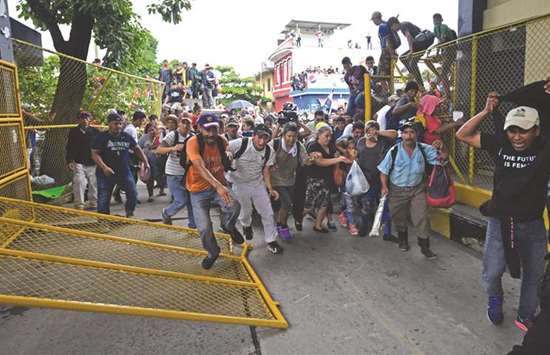Thousands of migrants, who forced their way through Guatemala’s northwestern border and flooded onto a bridge leading to Mexico where riot police battled them back, yesterday waited at the border in the hope of continuing their journey to the United States.
The caravan of mainly Honduran migrants, whose journey has triggered escalating anti-immigrant rhetoric from US President Donald Trump, on Friday surged through a series of police lines and barricades up to the final fence on Mexico’s southern border.
There — at the far end of the bridge over the Suchiate River, which forms the western part of the Mexico-Guatemala border — they hurled rocks and other objects at hundreds of riot police, who responded with rubber bullets and tear gas.
Multiple migrants, federal police and journalists were wounded.
“We’re running away from violence, and we arrive here and they just hit us more,” sobbed 28-year-old Marta Ornelas Cazares, who was nursing her baby — but had lost her other two children, aged 10 and 15, in the turmoil.
“I don’t know what happened, I thought we were going to cross peacefully and then suddenly there were rocks flying and tear gas,” she told AFP.
“We haven’t eaten, the soldiers just sent us some water,” Marina Alvarado, 48, said.
“We are imprisoned here, like animals. Please, open the door,” she pleaded.
Mexican authorities insisted the undocumented migrants would have to file asylum claims one at a time in order to enter the country.
They began letting them through in a trickle — first women and children, who were ushered onto trucks and taken to shelters.
Mexican President Enrique Pena Nieto described the situation as “unprecedented.”
“Violent entry into the country not only threatens our sovereignty, but also puts the migrants themselves at risk,” Pena Nieto said in a video published on his social media profiles.
He added Mexico remains willing to support migrants who enter the country and respect its laws.
The migrants are generally fleeing poverty and insecurity in Honduras, where powerful street gangs rule their turf with brutal violence.
With a homicide rate of 43 per 100,000 citizens, Honduras is one of the most violent countries in the world.
“We’re staying here until they open this fence,” said Adonai Sanchez, 36, who was travelling with his three nephews, aged two, three and 14.
Others returned to the Guatemalan side late Friday, where shelters have been providing them food and water.
The scene remained tense at the final border barrier, a tall fence of white metal bars.
Chanting “Yes we can!” and “Mexico! Mexico!” migrants earlier climbed or tore down a series of barriers, flooding across the bridge.
The migrants could be seen passing babies overhead through the crowd, as women holding crying children by the hand or pressing their infants to their chests streamed past the broken metal barriers and onto the bridge.
At the front of the caravan, one group briefly broke through the final fence before police forced them back and closed it again.
Some migrants used a rope to jump off the bridge and swim across the river or hitch a ride on the many rafts that cross it regularly.
Various caravans had been travelling by bus or on foot from Honduras, converging in recent days on the town of Tecun Uman, Guatemala, near the border bridge.
Authorities in Ciudad Hidalgo, on the Mexican side, were expecting around 3,000 migrants to arrive in total.
Back in Honduras, hundreds marched in the capital Tegucigalpa in solidarity with their compatriots.
On Thursday, Trump branded the migrant caravan an “onslaught” and an “assault on our country” in a series of typically fiery tweets.
He threatened to cut aid to the region, deploy the military and close the US-Mexican border if authorities did not stop them.
In Mexico City, US Secretary of State Mike Pompeo said after meeting his Mexican counterpart that migration across the two countries’ border is reaching “a moment of crisis” and posing “a challenge for American sovereignty.”
Mexican Foreign Minister Luis Videgaray insisted Mexico would not cave to pressure to detain the migrants, urging the Trump administration to address the root causes of their northward flight: violent crime and poverty.
“Mexico’s migration policy is for Mexico to decide,” he said.
But Mexico has also been keen to show Trump it is working to slow the stream of migrants.
The Republican billionaire has made curbing undocumented immigration a keystone of his presidency.
Barely a week goes by without him warning about the danger posed by ultra-violent Central American gangs like MS-13, while chants of “build the wall” are a staple of his campaign rallies ahead of next month’s US midterm elections.
International / US/Latin America
Headed to US, migrant caravan halted after storming Guatemala-Mexico border

Honduran migrants, heading in a caravan to the US, rush through the Guatemala-Mexico international border bridge after tearing down its gate in Ciudad Hidalgo, Chiapas state, Mexico.
